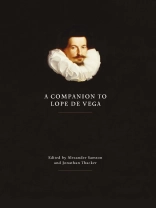An assessment of the life, work and reputation of Spain’s leading Golden Age dramatist
A Companion to Lope de Vega brings together work by leading international scholars on the life and writing of Lope de Vega Carpio, the ‘fénix de los ingenios’, a ‘monstruo de la naturaleza’, as he was described by his rival, Miguel de Cervantes. Spain’s foremost Golden Age playwright was in addition a major artist in prose and poetry, genres also covered by the
Companion. The contributions evaluate current critical debates and issues in Lopede Vega studies, as well as providing new readings of key texts. The volume attempts to do justice to the variety, profusion and originality of Lope’s output, and to outline the contours of his reputation as an artist in literaryhistory, as well as firmly contextualising his life and work. The variety of critical perspectives reflects the liveliness of debate surrounding this enduringly popular figure whose drama has recently enjoyed a renaissance in theatres around the globe.
ALEXANDER SAMSON lectures in Golden Age literature at University College London and JONATHAN THACKER is a Fellow in Spanish at Merton College, Oxford.
Contributors: Frederick De Armas, Elaine Canning, Geraldine Coates, Victor Dixon, Geraint Evans, Tyler Fisher, Edward H. Friedman, Alejandro García Reidy, Esther Gómez, David Johnston, Arantza Mayo, David Mc Grath, Barbara Mujica, Ali Rizavi, José María Ruano de la Haza, Alexander Samson, Jonathan Thacker, Isabel Torres, Xavier Tubau, Duncan Wheeler.
Содержание
Introduction: Lope’s Life and Work
Lope’s Knowledge — Victor Dixon
Lope de Vega and the Theatre in Madrid — José María Ruano de la Haza
From Stage to Page: Editorial History and Literary Promotion in Lope de Vega’s
Partes de Comedias — Alejandro Garcia Reidy
Imagining Lope’s Lyric Poetry in the ‘Soneto primero’ of the
Rimas — Tyler Fisher
‘Quien en virtud emplea su ingenio…’: Lope de Vega’s Religious Poetry — Arantza Mayo
Outside In: The Subject[s] at Play in
Las rimas humanas y divinas de Tomé de Burguillos — Isabel Torres
The
Arte nuevo de hacer comedias: Lope’s dramatic statement — Jonathan W. Thacker
Three Canonical Plays — Alexander Samson and Jonathan W. Thacker
Lope de Vega, the Chronicle-Legend Plays and Collective Memory — Geraldine Hazbun
Sacred Souls and Sinners: Abstinence and Adaptation in Lope’s Religious Drama — Elaine Canning
Lope, the comedian — Jonathan W. Thacker
Lope de Vega’s Speaking Pictures: Tantalizing Titians and Forbidden Michelangelos in
La quinta de Florencia — Frederick A de Armas
Performing Sanctity: Lope’s Use of Teresian Iconography in
Santa Teresa de Jesús — Barbara Mujica
Masculinities and Honour in
Los comendadores de Córdoba — Geraint Evans
El castigo sin venganza and the Ironies of Rhetoric — Edward H Friedman
Life’s Pilgrim:
El peregrino en su patria — Alexander Samson
Novelas a Marcia Leonarda — Ali Rizavi
La Dorotea: a Tragicomedy in Prose — Xavier Tubau
Lope as Icon — David Mc Grath
A Modern Day
Fénix: Lope de Vega’s Cinematic Revivals — Duncan Wheeler
Lope in Translation: Opening the Closed Book — David Johnston
Translations of Titles
Guide to Further Reading
Bibliography
Об авторе
JONATHAN THACKER is King Alfonso XIII Professor of Spanish Studies at the University of Oxford and Professorial Fellow at Exeter College, Oxford.












